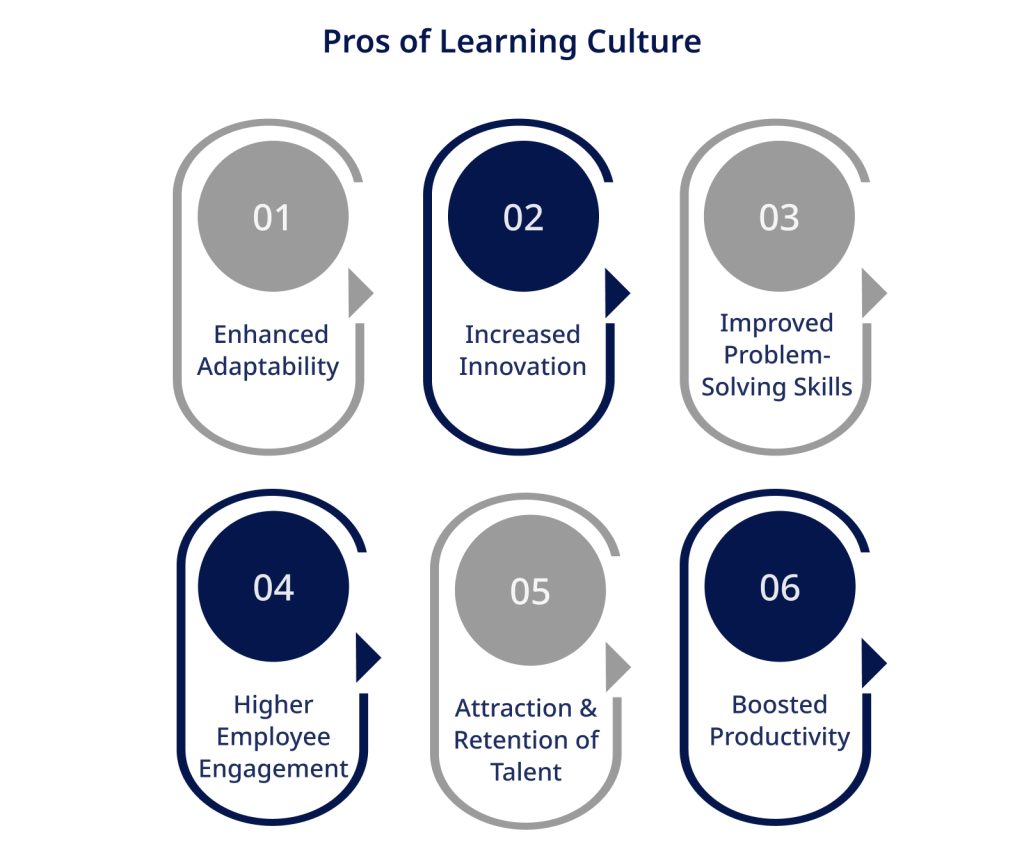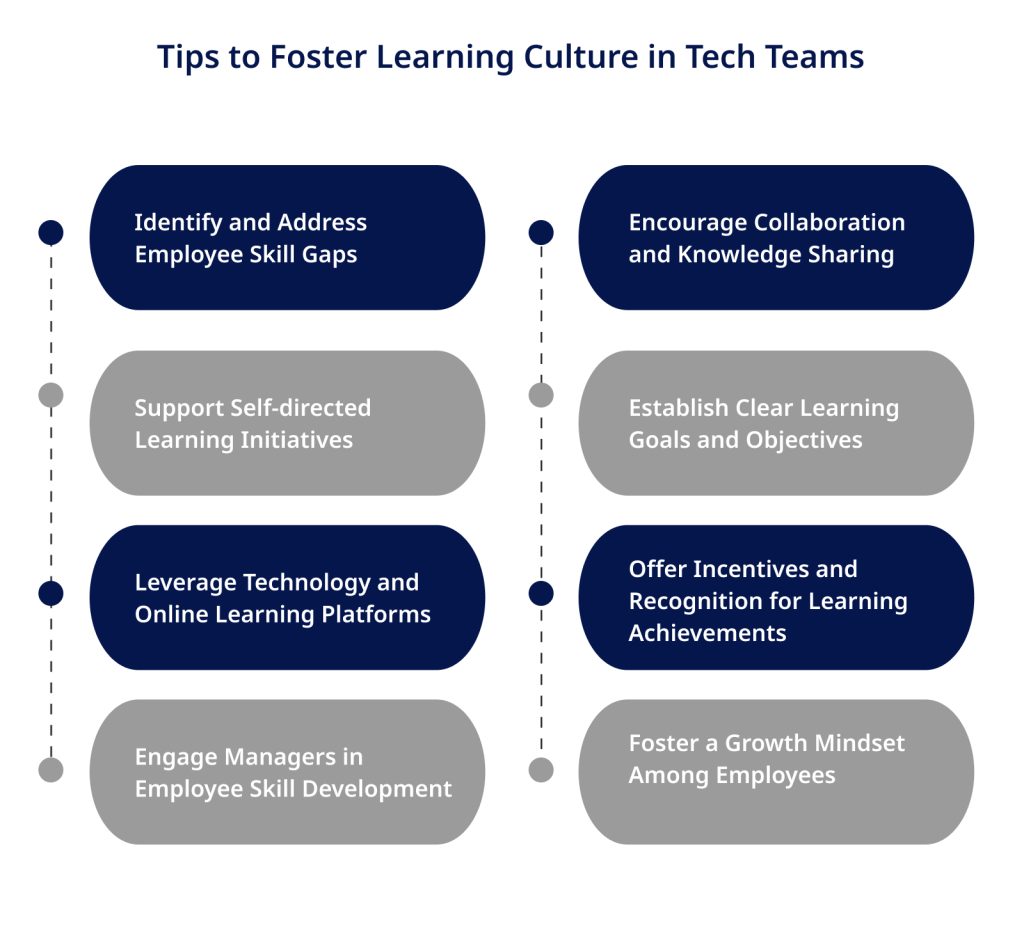It’s more crucial than ever to keep ahead of the competition with emerging tech trends in today’s ever-changing business environment.
Establishing a culture of continuous learning within your organization is one of the best methods to future-proof your workforce. Consistently fostering skill development among staff members benefits them individually and improves the organization’s overall effectiveness.
This article will discuss the value of ongoing education in the cutthroat business world and the many benefits your organization can get from fostering a learning culture.
Benefits of Learning Culture
In the ever-evolving landscape of technology, cultivating a culture of continuous learning within tech teams is paramount for staying ahead. This commitment to ongoing education brings forth the following advantages: creating a perfect place for innovators, learning for individual growth, and the collective success of the entire team.
- Enhanced Adaptability
Tech teams that adopt a learning culture can quickly adjust to changing market trends and technology because they have the knowledge and attitude to do so.
Team members get better at adapting to changes in emerging tech trends, development processes, or programming languages. This increased flexibility makes the team more adaptable to technological changes, facilitating a more seamless adoption of new procedures and processes.
- Increased Innovation
To build an empowered workplace, team members are encouraged to experiment, explore, and think creatively in an environment fostered by a learning culture.
IT workers become innovation catalysts by constantly broadening their expertise. They are more likely to offer original concepts, creative problem-solving methods, and game-changing fixes.
In addition to advancing the team, this invention places the company at the forefront of technological development and builds the company’s reputation for creativity and forward-thinking within the sector.
- Improved Problem-Solving Skills
Tech teams are empowered to continuously improve their problem-solving skills when they have a learning culture. Team members cultivate a proactive approach toward tackling obstacles by fostering a curious and exploratory mindset.
Continuous learning encourages the development of new abilities, viewpoints, and approaches, empowering IT workers to take on challenging problems and develop creative solutions.
This flexibility is essential in the rapidly changing tech industry, where success is defined by one’s capacity to understand and solve complex issues.
- Higher Employee Engagement
Within tech teams, a continuous learning culture has a major positive impact on employee engagement. People are more committed to the company and feel more encouraged in their professional development when they perceive prospects for advancement.
Initiatives for ongoing learning, whether through cooperative projects, mentoring, or training courses, give people a sense of direction and investment in their careers.
A healthy and dynamic work environment is fostered by engaged individuals who are more likely to contribute proactively to team objectives.
- Attraction and Retention of Talent
A learning culture within a tech team is a powerful magnet for top talent. Professionals in the tech business seek places that foster growth and development due to their competitive nature.
A company that prioritizes ongoing education and learning for tomorrow sends a message to prospective employees that their abilities will be recognized and they will have chances to learn more.
Additionally, current team members are more inclined to stick with a business that supports their professional growth, which helps to maintain a competent and stable staff in building an empowered workforce.
- Boosted Productivity
Continuous employee learning and development fosters a proactive attitude and a dedication to staying current with industry innovations. Consequently, this improves both team and individual productivity.
Team members can solve problems creatively and effectively with access to the most recent information and abilities. A learning culture also encourages the adoption of time-saving and emerging tech trends & technologies and procedures, which boosts the tech team’s productivity even more.
The connection between increased output and ongoing learning becomes crucial to a company’s success.
Ways to Foster Learning Culture in Tech Teams
Developing a learning culture within tech teams entails implementing several plans and programs that promote ongoing learning and information exchange. Here are a few ways that work well for fostering a culture of learning:
- Identify and Address Employee Skill Gaps
Fostering a learning culture begins with a thorough assessment of the existing skill set within the tech team. Assess employees’ skills regularly to find out where they might be lacking or could use further work.
After these skill shortages have been discovered, develop specialized training sessions or learning programs to fill them.
This proactive strategy shows the organization’s commitment to individual growth and development and guarantees that team members have the abilities required for their responsibilities.
- Encourage Collaboration and Knowledge Sharing
The foundation of a robust learning culture is collaboration. Provide your team members with platforms and opportunities to share their experiences and knowledge.
Organize frequent team gatherings, workshops, or online discussion boards where people can share their ideas, work, or difficulties.
A collaborative atmosphere where team members may learn from one another is fostered by promoting an atmosphere of open communication and knowledge exchange.
It helps the tech team grow and innovate while fostering a collective intelligence that improves individual skill sets.
- Support Self-Directed Learning Initiatives
Encouraging self-directed learning gives tech team members the confidence to take charge of their professional growth. Give users access to various educational materials, including tutorials, online courses, and documentation.
Establish a culture where inquiry and investigation are valued, enabling team members to investigate subjects that align with their interests and professional objectives.
Encourage team members to share their self-directed learning experiences through regular check-ins or talks, promoting their sense of autonomy and personal development with the power of feedback.
- Establish Clear Learning Goals and Objectives
Clearly, stated learning objectives and goals give the tech team a path for ongoing development. Collaborate with colleagues to establish personalized learning goals corresponding to personal and professional ambitions and the company’s strategic objectives.
These goals must be time-bound, relevant, quantifiable, achievable, and targeted (SMART). Ensure these objectives are continually reviewed and updated to align with changing market trends and the team’s overall skill requirements.
Clarifying learning objectives promotes a team-wide, goal-oriented, intentional approach to ongoing learning.
- Leverage Technology and Online Learning Platforms
Accept the plethora of information made possible by technology and online education sites. Tech team members should be encouraged to look into interactive modules, webinars, and e-learning courses that meet their individual needs for skill development.
Make use of resources that offer team members flexible learning options by giving them access to a wide variety of tech-related knowledge on demand.
You may establish a relaxed and easily accessible learning environment that aligns with the ever-changing IT industry by incorporating technology into the teaching and learning process.
- Offer Incentives and Recognition for Learning Achievements
Encourage ongoing education by putting incentive schemes and recognition campaigns into place. Acknowledge and honor team members who take the initiative to obtain new certificates, acquire new abilities, or reach important learning objectives.
Think about creating a system of awards, such as diplomas, badges, or even material incentives like extra vacation days or funds for professional development.
Continuous learning within the tech team is meaningful as it sends a clear message that the firm values individual growth when acknowledging and appreciating the efforts put into learning.
- Engage Managers in Employee Skill Development
To promote a learning culture, it is essential to actively include management in the tech team members’ skill development. Managers perform crucial tasks by setting expectations, offering direction, and giving funds for programs aimed at continual learning.
Organizations may customize learning opportunities to meet particular needs by assisting managers in recognizing the unique strengths and chances for development within their workforce.
This engagement not only shows that leadership values education but also guarantees that skill growth is in line with individual and organizational objectives
- Foster a Growth Mindset among Employees
Establishing a strong learning culture in the tech team starts with encouraging a growth mindset.
Skills and intelligence may be developed via commitment and effort are emphasized by a growth mindset. Fostering a mindset where team members perceive obstacles as chances for education and enhancement fosters a favorable atmosphere for ongoing skill enhancement.
Instead of concentrating on results, leadership should promote this approach by acknowledging and applauding efforts, resiliency, and advancement.
Team members with a growth mindset are more resilient and curious, encouraging them to welcome new technologies and approaches with open minds.
Final Words
Your organization must cultivate a culture of ongoing learning to stay ahead in the cutthroat economic world of today.
By investing in, promoting, and supporting employee growth and development, you can build a highly trained and flexible workforce to meet the demands of a constantly changing market.
We looked at how to encourage ongoing learning in your company in this blog post. These ways support the growth of your staff members’ competencies and increase retention, engagement, and satisfaction, all promoting business performance. For further help, you can also hire dedicated software development teams or software testing teams to help your team.
Remember that working with a reliable IT staff augmentation services company can be a great advantage as you set out to develop a learning culture inside your business.


